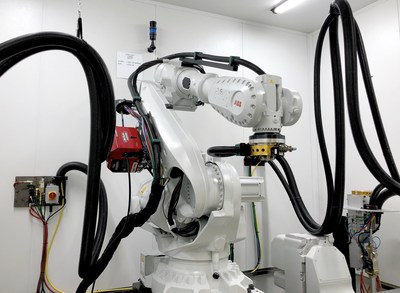U.S. Navy research contract could make complex metal additive manufacturing a reality both in production centers and deep in the field
DENVER, Oct. 1, 2018 — (PRNewswire) — Today, 3-D printing generates parts used in ships, planes, vehicles and spacecraft, but it also requires a lot of babysitting. High-value and intricate parts sometimes require constant monitoring by expert specialists to get them right. Furthermore, if any one section of a part is below par, it can render the whole part unusable. That's why Lockheed Martin (NYSE: LMT) and the Office of Naval Research are exploring how to apply artificial intelligence to train robots to independently oversee—and optimize—3-D printing of complex parts.
The two-year, $5.8 million contract specifically studies and will customize multi-axis robots that use laser beams to deposit material. The team will develop software models and sensor modifications for the robots to build better components.
"We will research ways machines can observe, learn and make decisions by themselves to make better parts that are more consistent, which is crucial as 3-D printed parts become more and more common," said Brian Griffith, Lockheed Martin's project manager. "Machines should monitor and make adjustments on their own during printing to ensure that they create the right material properties during production."
Researchers will apply machine learning techniques to additive manufacturing so variables can be monitored and controlled by the robot during fabrication.
"When you can trust a robotic system to make a quality part, that opens the door to who can build usable parts and where you build them," said Zach Loftus, Lockheed Martin Fellow for additive manufacturing. "Think about sustainment and how a maintainer can print a replacement part at sea, or a mechanic print a replacement part for a truck deep in the desert. This takes 3-D printing to the next, big step of deployment."
Currently, technicians spend many hours per build testing quality after fabrication, but that's not the only waste in developing a complex part. It's common practice to build each part compensating for the weakest section for a part and allowing more margin and mass in the rest of the structure. Lockheed Martin's research will help machines make decisions about how to optimize structures based on previously verified analysis.
That verified analysis and integration into a 3-D printing robotic system is core to this new contract. Lockheed Martin, along with its strong team, will vet common types of microstructures used in an additive build. Although invisible from the outside, a part could have slightly different microstructures on the inside. The team will measure the performance attributes of the machine parameters, these microstructures and align them to material properties before integrating this knowledge into a working system. With this complete set of information, machines will be able to make decisions about how to print a part that ensures good performance.
The team is starting with the most common titanium alloy, Ti-6AI-4V, and integrating the related research with seven industry, national lab and university partners.
About Lockheed Martin
Headquartered in Bethesda, Maryland, Lockheed Martin is a global security and aerospace company that employs approximately 100,000 people worldwide and is principally engaged in the research, design, development, manufacture, integration and sustainment of advanced technology systems, products and services. This year the company received three Edison Awards for ground-breaking innovations in autonomy, satellite technology and directed energy.

![]() View original content to download multimedia:
http://www.prnewswire.com/news-releases/lockheed-martin-contract-to-marry-machine-learning-with-3-d-printing-for-more-reliable-parts-300721935.html
View original content to download multimedia:
http://www.prnewswire.com/news-releases/lockheed-martin-contract-to-marry-machine-learning-with-3-d-printing-for-more-reliable-parts-300721935.html
SOURCE Lockheed Martin
| Contact: |
| Company Name: Lockheed Martin
Mark Lewis Phone: +1 408-203-8093 / Email Contact Web: http://www.lockheedmartin.com Financial data for Lockheed Martin |









